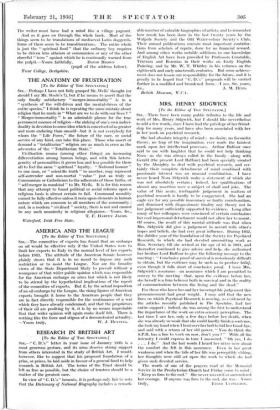MRS. HENRY SIDGWICK
[To the Editor of THE SPECTATOR.] SIR,—There have been many public tributes to the life and work of Mrs. Henry Sidgwick, but I should like nevertheless to add a few words, since I have had the privilege of her friend- ship for many years, and have also been associated with her in her pork on psychical research.
She had absolute integrity of mind : no desire, no favourite theory, no leap of the imagination, ever made the faintest mark upon her intellectual processes. Arthur Balfour once said to me with laughter that he could not help thinking. Nora—as she was always called in the family—along with Gerald (the present Lord Balfour) had been specially created by the Almighty to deal with psychical research, and cer- tainly their complete detachment of mind combined with passionate interest was an unusual combination. I have never heard Nora Sidgwiek make a statement of which she was not absolutely certain ; indeed, her qualifications of almost any assertion were a subject of chaff and joke. The value of this acute, irrefragable judgement in matters of psychical research is hardly to be exaggerated. She had an eagle eye for any possible inaccuracy or faulty corroboration, and dismissed with dispassionate finality any theory not in her judgement sufficiently supported by evidence. Long after many of her colleagues were convinced of certain conclusions her cool impersonal detachment would not allow her to assent. Of course, the result of this mental attitude was that when Mrs. Sidgwiek did give a judgement in accord with other's hopes and beliefs, she had very great influence. During 1932, the Jubilee year of the foundation of the Society for Psychical Research, to which she had devoted unremitting work as Hon. Secretary till she retired at the age of 85 in 1931, and thereafter continued to give advice and help, she authorised her brother Lord Balfour to give the following message to the meeting : " Conclusive proof of survival is notoriously difficult to obtain, but the evidence may be such as to produce belief, even though it falls short of conclusive proof. I have Mrs. Sidgwick's assurance--an assurance which I am permitted to convey to the meeting--that, upon the evidence before her, she herself is a firm believer both in survival and in the reality of communication between the living and the dead."
For those who knew her and her incorruptible judgement this pronouncement had great weight. I may add that the new lines on which Psychical Research is moving, as evidenced by the articles recently published in The Spectator, had her entire support ; indeed, she was among the first to understand the importance of the work on extra-sensory perception. The last time I saw her, only a few days before her death, when she was already so weak that she could hardly finish a sentence, she took my hand when I bent over her bed to bid her Good-bye, and said with a return of her old power, " You do think the S.P.R. has a line to work on now, don't you ? " With all the intensity I could express in tone I answered, " Oh yes, I do . . . I do." And the last words I heard her utter were about the comfort she felt in this assurance. Even in her great weakness and when the tide of her life was perceptibly ebbing, her thoughts were still set upon the work to which she had given such devoted service.
The words of one of the prayers read at the Memorial Service in the Presbyterian Church last Friday come to mind : " Keep us firm to the end." She never wavered or surrendered her courage. If anyone was firm to the end, she was. --Yours














































 Previous page
Previous page